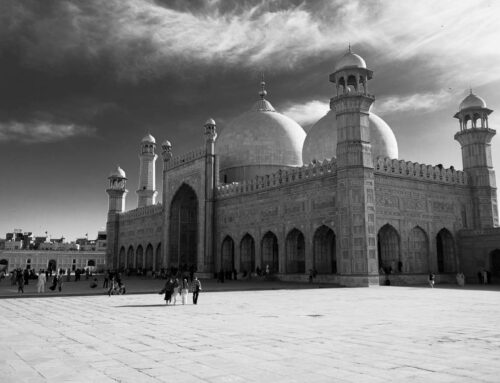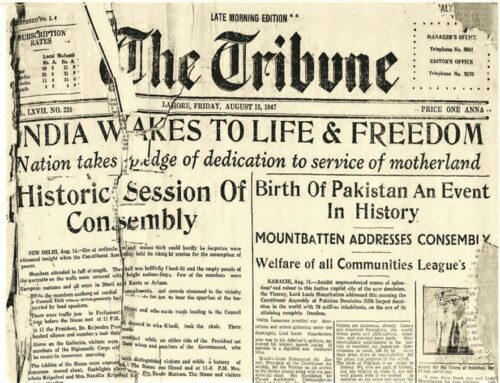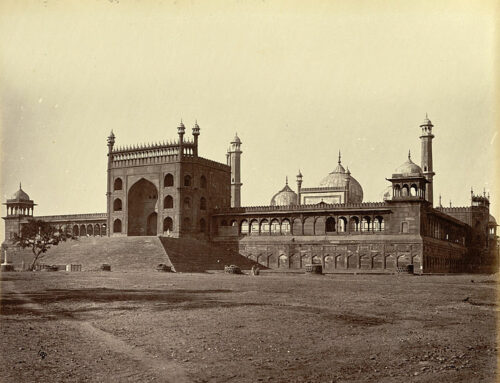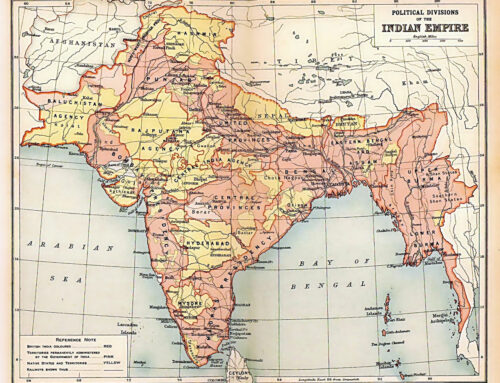Translated by Zameelur Rahman
‘Abdullah ibn Maslamah ibn Qa’nab and Qutaybah ibn Sa’d narrated to us, they said: al-Mughirah (al-Khizami) narrated to us.
Zuhayr ibn Harb and ‘Amr al-Naqid narrated to us, they said: Sufyan ibn ‘Uyaynah narrated to us.
Both of them [al-Khizami and ibn ‘Uyaynah narrated] from ibn al-Zinad: from al-A’raj: from Abu Hurayrah, he said: Allah’s Messenger (Allah bless him and grant him peace) said; and in the narration of Zuhayr: the Prophet (Allah bless him and grant him peace) conveyed; and ‘Amr said: narrating:
“People are subservient to Quraysh in this matter: the Muslims among them [being subservient] to the Muslims among them, and the disbelievers among them [being subservient] to the disbelievers among them.” (Sahih Muslim)
His statement “from Abu Hurayrah”: this hadith was transmitted by al-Bukhari in the beginning [chapters] of Kitab al-Manaqib (no. 3495) and it was also transmitted by Ahmad in his Musnad (2:243, 261, 395, 433).
His statement “People are subservient to Quraysh in this matter”: the ‘ulama adduced this as proof that Qurayshi [lineage] is a condition for the Imam, to the extent that some of them claimed ijma’ (consensus) on this. Hence, al-Nawawi (Allah have mercy on him) said, “These hadiths and those similar to them are clear proof that the caliphate is specific to Quraysh and its contraction is not permissible for any beside them, and on this ijma’ convened in the time of the Companions and also after them. So whoever disagrees in this [matter] amongst the heretics (ahl al-bid’ah), or alludes to a disagreement from other than them, he is confuted by the ijma’ of the Companions and the Successors, and those after them by the authentic hadiths.”
The weak servant (Allah pardon him) says:
Relating ijma’ on this matter calls for a re-evaluation, since the opposite of this was narrated from a number of Muslim scholars. The ‘ulama of Usul al-Fiqh (Legal Theory) and Kalam (Dialectical Theology) regard this condition to be from the conditions that are disputed. Here are some of the disagreements that have been transmitted in this regard:
(1) Hafiz [Ibn Hajar al-‘Asqalani] said in al-Fath (13:119), “In order to convey ijma’, it is necessary to interpret what has been transmitted from ‘Umar (Allah be pleased with him) on this, as Ahmad transmitted from ‘Umar with a chain whose narrators are trustworthy that he said, ‘If my appointed time [of death] reached me and Abu ‘Ubaydah were living, I would appoint him as caliph.'” He then narrated the hadith which includes [the statement], “‘And if my appointed time reaches me and Abu ‘Ubaydah is dead I would appoint Mu’adh ibn Jabal as caliph’ to the end of the hadith. Mu’adh ibn Jabal (Allah be pleased with him) is an Ansari with no [familial] connection to Quraysh.” This is a very strong proof that ‘Umar (Allah be pleased with him) did not believe Qurayshi [lineage] is a condition for the caliphate. As for what al-Hafiz followed this up with, by his statement, “And it is possible one may argue: probably the ijma’ on the conditionality of the caliph being Qurayshi occurred after ‘Umar or ‘Umar’s judgement changed,” it is as you see.
(2) All of the ‘ulama have related the statement of Dirar ibn ‘Amr al-Ghatafani [1]He was a follower of the Mu’tazilite Wasil ibn ‘Ata’ and then separated from him, forming his own group called “Dirarah”. He died in the year 200 H/815 AD. For more on … Continue reading, “There is no distinction at all between one being Qurayshi or an Ethiopian slave, and neither of them have any advantage and merit over the other,” as [mentioned] in Sharh al-Ashbah wa ‘l-Naza’ir by al-Hamawi (2:267). What was said about this by one of the ‘ulama that “the Muslims did not consider this opinion after the establishment of the hadith ‘the Imams are from Quraysh’ and its practice by the Muslims century after century and by consideration of this, ijma’ convened before a dispute occurred,” Hafiz [ibn Hajar] refuted this by his statement, “I say: practice of the view of Dirar [occurred] before those who undertook the caliphate from Kharijites against the Umayyads, like al-Qatri, existed … Likewise, non-Kharijites were called Amir al-Mu’minin from those who stood against al-Hajjaj, like ibn al-Ash’ath, then the caliphate was used [as a title] for all who stood in a region from the regions in whatever time, so the caliphate was designated [for an individual] while [he was] not from Quraysh, like Banu ‘Abbad and others in Andalusia, and like ‘Abd al-Mu’min and his descendents in all of the West [African] lands. They resembled the Kharijites in this, although they did not profess their opinions, nor adopt their views, rather they were from the Ahl al-Sunnah and called to it.” See Fath al-Bari, Kitab al-Ahkam (13:118, 119)
(3) The most enlightened teacher of our teachers [Anwar Shah al-Kashmiri] (Allah have mercy on him) said, “Yes, in Mawahib al-Rahman [it is mentioned] that it [i.e. Qurayshi lineage] is not a condition according to our Imam (i.e. Abu Hanifa (Allah have mercy on him)). Moreover, I do not know whether this is a narration from him or not?” See Fayd al-Bari (4:498). If this is authentic, it would appear the non-conditionality [of Qurayshi lineage] is a narration from Abu Hanifah.
(4) Ibn Khaldun transmitted in the Muqaddimah (p. 169, chapter 26) that one of those who said being Qurayshi is not a condition is Qadi Abu Bakr al-Baqillani (Allah Most High have mercy on him), but I saw in his book Tamhid al-Awa’il (p. 471-3) that he supports the view of the conditionality of being Qurayshi.
(5) Imam al-Haramayn al-Juwayni (Allah have mercy on him) said in his book Al-Irshad, “[One] of the conditions of imamate according to our [Shafi’i] scholars is that the imam [must] be Qurayshi, since Allah’s Messenger (Allah bless him and grant him peace) said, ‘The imams are from Quraysh’ and he said ‘Put Quraysh ahead and do not go ahead of it’. This is something that some people had disagreements about, and there is [legitimate] scope in it for this [other] interpretation.” See Kitab al-Irshad fi Usul al-I’tiqad by al-Juwayni (p. 427)
Imam al-Haramayn’s (Allah have mercy on him) reservation on this issue also becomes clear from his statement in his book Ghiyath al-Umam fi al-Tiyath al-Zulam (p. 82, published in Qatar) where he says, “The reason for this [i.e. the conditionality of Qurayshi lineage] is that knowledge is claimed by every extremist zealot, and when the splendour of kingship combines with little knowledge, no one can attribute to the king absence of knowledge; but lineage is something that one cannot have claim to, so those who are not related [to Quraysh] will not claim imamate. Thus, this is the reason for affirming the conditionality of lineage. We do not rationalise the need to establish a lineage for the imamate, but Allah specified this high position and lofty rank to the members of the Prophetic household. That is from the grace of Allah, He gives it to whomever He wills.”
(6) Some contemporaries have transmitted from Shaykh al-Islam Ibn Taymiyyah (Allah Most High have mercy on him) that he professed [the view] of the non-conditionality of Qurayshi [lineage] for the caliph. See the footnotes of Dr. ‘Abd al-Azim al-Dib on Ghiyath al-Umam by al-Juwayni p. 82. However, I did not find this in its most likely locations in Fatawa Ibn Taymiyyah. And Allah knows best.
(7) ‘Allamah ‘Abd al-Qahir al-Baghdadi said in his book Usul al-Din (p. 275), “Al-Ka’bi believed that the Qurayshi is more deserving of it than the one who is suited to it from the non-Qurayshi, but if they fear a civil war, its contraction is permissible for a non-[Qurayshi].” Thus, it appears Qurayshi [lineage] is not a necessary condition according to al-Ka’bi and is only a condition of preference (awlawiyyah). However ‘Allamah al-Baghdadi did not identify this al-Ka’bi and he is probably Abu l-Qasim al-Ka’bi from the leaders of the Mu’tazilah to whom the sect al-Ka’biyyah is affiliated, so if he is the one meant [here] his statement does not violate consensus because of his corrupt beliefs [which is so severe] that some of the ‘ulama anathematised him [kaffarahu], as [mentioned] in al-Ansab by al-Sam’ani (11:123).
(8) ‘Allamah Ibn Khaldun spoke in his Muqaddimah about this condition in a lengthy discussion and he opined that the conditionality of Qurayshi [lineage] for the caliph is a ruling justified by a rationale and this [rationale] is superior group feeling (al-‘asabiyya al-ghaliba). He said in the 26th chapter of his Muqaddimah (p. 170): “Once it is established that Qurayshi [lineage] as a condition [of the imamate] was intended to remove dissension with the help of [Qurayshi] group feeling and superiority, and [if] we know that the Lawgiver does not make special laws for any one generation, period, or nation, we [also] know that [Qurayshi lineage] is due only to competence. Thus, we have linked it up with [the condition of competence] and have established the underlying cause [‘illa] included in the purpose behind Qurayshi [lineage], which is the existence of group feeling. Therefore, we consider it a condition for the person in charge of the affairs of the Muslims that he belong to people who possess a strong group feeling, superior to that of their contemporaries, so that they can force the others to follow them and the whole thing can be united for effective protection.” [2]This translation was extracted with slight modifications from Franz Rosenthal’s translation of Ibn Khaldun’s Muqaddimah
(9) Al-Ubbi said, “Al Amidi said: as for the conditions that are disputed, they are six: First, Qurayshi [lineage] and in regards to this is what was set forth beforehand. Al-Amidi said: and the like of this is for the imam. If it were not for ijma’, there would be scope for reconsideration and rethinking this condition, because the hadiths are solitary reports (akhbar ahad) and do not supply certitude, while they do accept reinterpretation.”
As for the hadith of the chapter, and the hadith, “The imams are from Quraysh”, it is understood by those who do not make Qurayshi [lineage] a condition as a declarative statement (khabar) and not a condition for contracting the caliphate, just as in his (Allah bless him and grant him peace) statement, “This matter will remain in Quraysh, so long as two of them remain” (the compiler [Imam Muslim] transmitted it, as is to come, and al-Bukhari in [Kitab] al-Ahkam [on the authority] of Ibn ‘Umar (Allah be pleased with him)); [also] as is to come in the hadith of Jabir ibn Samurah, “The religion will continue upright until the Hour has been established, or you have [been ruled] over by twelve Caliphs, all of them from Quraysh”; [also] as in the hadith of Abu Musa (Allah be pleased with him), “Verily this matter [of rule] shall [remain] in Quraysh so long as when they are asked for mercy, they show mercy, when they rule, they are just, and when they distribute, they are equitable, so whoever from them does not do this, then upon him is the curse of Allah, the angels and all of humankind, and compulsory acts and voluntary acts will not be accepted from him” (Ahmad, al-Bazzar and al-Tabrani narrated and the narrators of Ahmad are trustworthy as [mentioned] in Majma’ al-Zawa’id (5:193)); and as in the hadith of Abu Mas’ud al-Ansari, he said Allah’s Messenger (Allah bless him and grant him peace) said to Quraysh, “Verily this matter [of rule] shall [remain] among you and you shall remain in charge of it, until you innovate actions [that deprives you of Allah’s support], and when you do this, Allah shall impose upon you the worst of His creation which will tear you apart just as a stick is torn apart.” (Ahmad and al-Tabrani narrated it and the narrators of Ahmad are the narrators of Sahih except al-Qasim ibn Muhammad ibn ‘Abd al-Rahman ibn al-Harith who is trustworthy as [mentioned] in Majma’ al-Zawa’id); and also it was narrated in the hadith of Anas (Allah be pleased with him) in marfu’ form, “The imams are from Quraysh so long as they do three [things]: when they are asked for mercy, they show mercy; when they make a treaty, they keep [it]; and when they rule, they are just” (Al-Bazzar transmitted it in his Musnad as [mentioned] in Kashf al-Astar by al-Haythami (2:228)).
They adduce as proof His statement (Most High), “O mankind! Lo! We have created you male and female, and have made you nations and tribes that ye may know one another” (Qur’an 49:13), since it is clear in negating superiority on the basis of lineage; and his (Allah bless him and grant him peace) statement, “There is no superiority of an Arab over a non-Arab.” They also adduce as proof what is to come from the compiler in Bab Ta’at al-Umara from Umm al-Husayn (Allah be pleased with her) in marfu’ form: “If a maimed slave is appointed a commander over you ([the narrator said:] I think she said “a black slave”) who leads you according to the Book of Allah, then listen to him and obey,” because this proves the permissibility of an Ethiopian slave being a commander (amir). However, this proof is weak because, firstly, it is possible that the meaning of it is the commander of an army, not the caliph, as was interpreted as such by al-Nawawi and others; and, secondly, it is possible that the servant mentioned therein is related to Quraysh, because the freed-slaves of a people are from them, as interpreted as such by others; and, thirdly, it is possible that the meaning of it is a man who contracted the caliphate by his domination, not by the selection of the Ahl al-Hall wa ‘l-‘Aqd (lit. those who untie and tie i.e. the leading scholars of the law), and the discussion [here] is about the criteria for selection, not domination.
Moreover, all of this is when one who is qualified for caliphate from Quraysh is present. As for when one who combines the qualities required is not found, then there is no dispute in the permissibility of contracting the caliphate for a non-Qurayshi, and I would think it is the same when the people have forsaken their lineages and it is not certain [whether] a man is from Quraysh or not. Furthermore, these conditions are only considered when the caliphate is contracted by the Ahl al-Hall wa ‘l-‘Aqd. However, when a Muslim man becomes dominant and becomes imam by his dominance, then he assumes the rules of imamate even if these conditions are absent in him, and his regulations are executed and his appointments are sound, and following his judgement is permissible, as was clarified by the fuqaha (jurists). See for example Sharh al-Ashbah wa l-Nazair by al-Hamawi (2:267)
(Takmilah Fath al-Mulhim, vol. 3, pp. 231-234)
| ↑1 | He was a follower of the Mu’tazilite Wasil ibn ‘Ata’ and then separated from him, forming his own group called “Dirarah”. He died in the year 200 H/815 AD. For more on them, see Al-Milal wa l-Nihal by al-Shahrastani (1:120-1) |
|---|---|
| ↑2 | This translation was extracted with slight modifications from Franz Rosenthal’s translation of Ibn Khaldun’s Muqaddimah |







As salamualaykum mufti,
Is the above article about the four imams of fiqh (hanafi,shafi,maliki,hanbali) or is it about the rulers of people,rulers of government etc
Sorry but my islamic terms are not good.
Waiting for your reply.
was salam.
When he says imam, he is talking about the ruler of a muslim country.